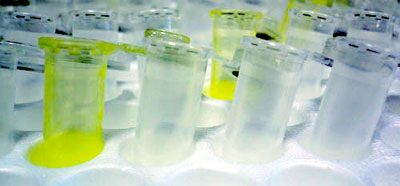Have you ever heard of diseases that cause problems with the immune system? They’re called autoinflammatory diseases, and they cause cells that are supposed to protect the body from outside bacteria and viruses to attack your own body by mistake! One of the most common of these diseases is Familial Mediterranean Fever (FMF). FMF is monogenic, meaning it is controlled by only one gene. Unfortunately, as with most autoinflammatory disease, FMF is extremely difficult to diagnose mainly because its symptoms are similar to so many other conditions.

Photo obtained from Flickr
Geneticists have been able to determine that FMF is caused by mutations, or genetic differences, in the MEFV gene. This gene codes for a sensor of a complex of proteins called an inflammasome. Inflammasomes serve as danger signals that let the immune system know when foreign molecules such as viruses are present in the body. The specific inflammasome sensor that this disease stems from is called Pyrin. Although genetic tests are able to pick out these mutations in the MEFV gene, diagnosing FMF is a bit more complicated because there are over 340 different versions of the gene and many of these versions don’t have a clear association with a specific phenotype, a visible trait that results from a gene.
A paper published in April of 2020 shows the extraordinary results that can come from combing clinical and genetic knowledge.
A group of scientists from Belgium, China, Italy and the Netherlands were able to develop an assay that has the potential to improve the diagnostic capability for FMF.
This test involved taking three different kinds of samples from patients. The first were peripheral blood mononuclear cells (PBMCs) which are blood cells that have a round nucleus; in humans these blood cells consist mainly of lymphocytes which are better known as B cells and T cells. These samples were taken from patients who had autoinflammation that was associated with the Pyrin sensor mentioned previously. The patients either had FMF, had autoinflammatory symptoms that are not known to be related to FMF, were carriers who did not experience FMF symptoms, or healthy donors which served as the control group. The second sample was blood serum taken from patients who had distinct autoinflammatory diseases. The third was a regular “whole” blood sample taken from small groups of both the patients and controls (healthy donors). There was also an assessment of clinical, demographic, and molecular genetic factors to determine their impacts on the diagnostic results.
This assay yielded excellent results. It was able to differentiate FMF patients from the controls and from patients with related clinical disorders. That is a huge solution to the problems experienced through clinical diagnosis! On the genetics end, the test was also able to separate the patients who had known FMF mutations from those who had other mutations in the MEFV gene that are not considered to be FMF related. As with all new methods, this assay will have to be tested and retested to make sure these results were significant. But for now, we can have faith that this test has real potential to help people who are struggling to get a diagnosis of FMF!
Van Gorp H, Huang L, Saavedra P, et al (2020). Blood-based test for diagnosis and functional subtyping of familial Mediterranean fever. doi: 10.1136/annrheumdis-2019-216701

Alex
"This title was very eye catching! That is so interesting that such a ..."
Alex
"This is really interesting! The fact that crops and plants are damaged is ..."
Alex
"Well done, this article is great and the information is very captivating! Ethics ..."
Alex
"I was intrigued throughout the whole article! This is such an interesting topic, ..."
Alex
"This is such an interesting article, and very relevant!! Great job at explaining ..."
Grandpa
"Honey You Did a good job I will forward to my eye doctor "
murphymv
"This article is fascinating because it delves into the details of the research ..."
murphymv
"I agree, adding the photo helped solidify the main finding. "
murphymv
"This is a fascinating finding. I hope this innovative approach to improving transplants ..."
Sherzilla
"This is a great article! I would really love to hear how exactly ..."
Sherzilla
"It's disappointment that these treatments were not very effective but hopefully other researchers ..."
Sherzilla
"I agree with your idea that we need to shift our focus to ..."
Sherzilla
"It's amazing to see how such an everyday household product such as ..."
Lauren Kageler
"I will be interested to see what the data looks like from the ..."
Lauren Kageler
"A very interesting article that emphasizes one of the many benefits that the ..."
maricha
"Great post! I had known about the plight of Little Browns, but I ..."
Sherzilla
"I assumed cancer patients were more at risk to the virus but I ..."
Sherzilla
"Great article! It sheds light on a topic that everyone is curious about. ..."
maricha
"This article is full of really important and relevant information! I really liked ..."
maricha
"Definitely a very newsworthy article! Nice job explaining the structure of the virus ..."
maricha
"It's interesting to think that humans aren't only species dealing with the global ..."
murphymv
"This is very interesting and well explained. I am not too familiar with ..."
Lauren Kageler
"Great article! This post is sure to be a useful resource for any ..."
Lauren Kageler
"Definitely seems like an odd pairing at first, but any step forward in ..."
murphymv
"What an interesting article! As you say, height and dementia seem unrelated at ..."
murphymv
"Great article! I learned several new methods of wildlife tracking. This seems like ..."
murphymv
"Very interesting topic! You explained cascade testing and its importance very well. I ..."
Alex
"This article is really interesting! What got me hooked right away was the ..."
Sabrina
"I found this article super interesting! It’s crazy how everyday products can cause ..."
Erin Heeschen
"I love the layout of this article; it's very eyecatching! The advancements of prosthetics ..."
murphymv
"Awesome article! I like the personality in the writing. Flash Graphene not only ..."
murphymv
"Very interesting work! I don't know a whole lot about genetics, but this ..."
Cami Meckley
"I think the idea of using virtual reality technology to better help prepare ..."
Erin Heeschen
"I wonder if there's a connection between tourist season and wildfires in the ..."
Ralph berezan
"Not bad Good work "
Michelle
"This sounds like it would be a great tool for medical students! ..."